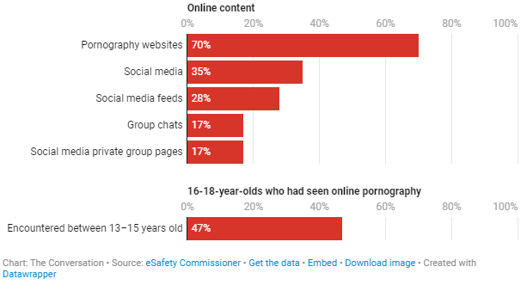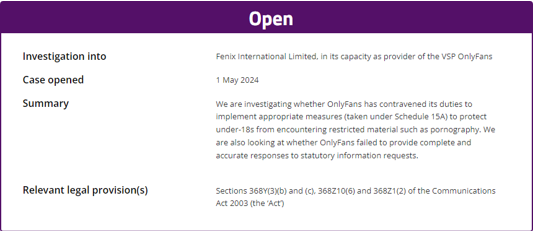The Digital Child Newsletter - 2nd May
Big news:
A French report recommended that children shouldn’t have smart phones before 13 or social media before 18
Australia invests in trials for age-verification technology
Ofcom launches an investigation into OnlyFans
France:
Children and Screens: A report commissioned in January by French President Emmanuel Macron has been published this week. The 142 page “Enfants et écrans” (children and screens) report highlighted concerns about the tech industry's profit-driven strategies targeting children, and advocates for protecting young people from becoming "merchandise" in the digital market. More information here.
Among the stark recommendations were:
A blanket ban on screen for under 3s
“Strongly limited” screen use for children up to 6
No phones before 11
No Smartphone before 13
Only “ethical social media” at 15
Normal Social media at 18
"We want [the industry] to know we’ve seen what they’re doing and we won’t let them get away with it."
Enfants et écrans Report
Australia:
The tech trials: Albanese’s government have allocated nearly A$1billion to counter a surge in gender-based violence, including tackling "online harms." The pilot program explores the use of age-checking technologies to limit children's access to inappropriate online material. This hopes to address the impacts of underage exposure to adult content in fuelling harmful attitudes toward women and girls.
It follows growing calls for mandatory regulations and stricter oversight to ensure that platforms prioritize child safety. Especially given that "There’s no incentive for platforms to implement meaningful rules”. Alastair MacGibbon, the former eSafety commissioner, also pitched in, arguing…
As [Tech companies] become more powerful in our daily lives, so, too, should their responsibility to do the right thing."
Alastair MacGibbon, former eSafety commissioner
Or, in other words, “with great power comes great responsibility.”
OnlyFans:
Ofcom vs. OnlyFans: Ofcom is currently investigating OnlyFans’ compliance with its duties to protect under-18s from restricted material and respond to information requests. Expect an update by August. Full details here.
We remember when Only Fans age checks were “the model to follow”…
Big Tech:
Feeling lonely? Meta has come under fire for promoting sexually explicit apps. Wired found over 29,000 explicit “AI girlfriend” ads, despite the company's policies against adult content.
Around the World:
UK:
Tech needs to change: This opinion piece by Ian Russell, chair of the Molly Rose Foundation, argues that the focus of government policy must be on holding tech companies accountable through strengthened legislation and regulatory oversight, not on changing childhood. Definitely worth a read, but here’s a snippet:
“Until we change the commercial, legal and regulatory incentives on social media companies by targeting the commercial and design choices that enable them to prey on and exacerbate the insecurities of young people, an entire generation will continue to be blighted by tech companies that opt to monetise their misery”
Sound ambitious? The Children’s Commissioner for England released their statement on “The Big Ambition for Online Safety”, as part of the wider “Big Ambition” report. It contained some raw quotes from young people themselves. See two below.
“Restrict social media usage and make it safer to use. More and more younger children have easy access and this ruins their childhood and future.”
Girl, 16.
“Online safety is non-existent and parents are so ill-informed and don’t put restrictions in place (across the class spectrum) so I have friends who have seen porn, fighting and other inappropriate content and they are only 10/11 years old or younger. It feels like there is nothing in place to help.”
Girl, 12
USA:
Keep in the know: The best place for overall legislative updates can be found here. With each bill linked, the Safe Kids Online site has the bill name, summary and sponsors laid out.
Another new bill: Bill S. 474 chiefly does three things:
increases the amount of time—from 90 days to 1 year—that a provider must preserve the contents of a report,
requires (currently, authorises) providers to report on a violation that may be planned or imminent,
extends the requirement for providers to report apparent violations involving the sexual exploitation of children to include many other illegal sexual activities, and
the bill increases the maximum fines for providers who knowingly and wilfully fail to submit reports.
Essentially…
Alabama:
Deepfakes curtailed: Alabama Governor Kay Ivey signed the Alabama Child Protection Act of 2024, expanding the state's child pornography law to include deepfake images generated by artificial intelligence. This was prompted by a cyberbullying incident at Demopolis Middle School, where six female students had their faces superimposed on pornographic images by male classmates.

"It is great to see Alabama lead the nation on the important issue of AI-generated child sex abuse material. This is an unequivocal declaration that the State of Alabama has zero tolerance for the possession and production of child sex abuse material, regardless of how it was created."
Alabama Attorney General Steve Marshall
Texas:
Supreme court says no: The Supreme Court declined to block a provision of a Texas law aimed at preventing minors from accessing pornography online, despite challenges from the pornography industry. The law requires age verification for all users, including adults, which critics argue imposes an unconstitutional burden on accessing sensitive content. This currently leaves the law intact, prompting some online pornography platforms to block access in Texas.
On the one side:
"The act requires adults to comply with intrusive age verification measures that mandate the submission of personally identifying information over the internet in order to access websites containing sensitive and intimate content."
Challengers to the Texas law
On the other:
“[the act] simply requires the pornography industry that makes billions of dollars from peddling smut to take commercially reasonable steps to ensure that those who access the material are adults.”
Texas Attorney General Ken Paxton
Indonesia:
Violent Games goodbye: Seto Mulyadi, Chairman of the Indonesian Institute of Child Protection (LPAI), has called on the government to take action in protecting children from the negative effects of mobile games featuring violent content by implementing blocks. Mulyadi stressed, like Mr Russell, that the responsibility cannot solely fall on parents and urged for government enforcement of regulations.
"The government must be present in enforcing the regulation... We cannot only give the responsibility to parents because they encounter difficulty in supervising them."
Seto Mulyadi
Ireland:
Another rise in CSAM: Norma Foley, the Education Minister of Ireland, has expressed concern over the rise in child abuse materials online and the prevalence of children being "catfished" and groomed by online predators due to inadequate age verification systems on social media platforms. There has been an increase of over 2500% in CSAM removed from the internet by Ireland's national centre for combating illegal content over the past five years.
“[Social media platforms] must implement a robust age verification system of their own to protect children from inappropriate content and online predators … they have a duty of care to young people to do this”
Norma Foley
Top Tweets:
Policy Exchange on X: "1/ NEW REPORT DISCONNECT: THE CASE FOR A SMARTPHONE BAN IN SCHOOLS.
Miriam Cates on X: "Just 1 in 10 secondary schools has an effective phone ban. With @NeilDotObrien & 60 Conservative MPs & Peers I‘ve written to the Prime Minister asking government to fund phone lockers in all schools.












